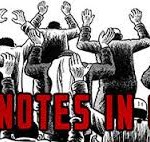Dear Subscribers,
I’m back. It’s been a long time. Where have I been? Helping found and run Kairos USA, writing a new book, and moving from Washington DC to wonderful Portland OR. Lots of travel, in the US and internationally. So there is a bit of catching up to do. I’ll begin by working backwards and posting something from my time last week in the UK at the Greenbelt Festival. How to describe Greenbelt? How about as a Woodstock for followers of Jesus? — a 4-day gathering of over 20,000 people of all ages that has been held annually for 40 years. I was honored to have been invited to give some talks and to participate in the launch of Kairos Britain. A future post on the emerging global kairos movement is in store. For now, I’ll use this this posting to share a bit about the stir that was caused by Greenbelt’s invitation of me and others (including Sami Awad of Holy Land Trust) to speak, and the Festival’s hosting of the Kairos Britain launch. The Council of Christians and Jews, a UK advocacy group that, in close coordination with the Board of Jewish Deputies — a Jewish advocacy group that bears some resemblance to our Anti-Defamation League — created a lot of critical press in advance of the Greenbelt Festival, claiming that it presented a biased and unbalanced view of Israel. They also accused me, and by implication the Festival, of fostering anti-Semitic attitudes and speech. The full statement is here. Very worthwhile reading is the excellent response by Robert Cohen, a British Jew who I had the pleasure to meet and hear speak at Greenbelt and who puts out a very fine blog.
Stay tuned for further postings. In the meantime, timed to coincide with the Jewish High Holy Days, here is my response to the CCJ’s charge that in challenging Zionism I have committed a “sweeping rejection of traditional Jewish teaching” and revived “the oldest form of Christian anti-Judaism.”
RESPONSE TO CCJ STATEMENT ON ISRAEL/PALESTINE PROGRAMMING BY GREENBELT
In its recent comments on my remarks at the 2013 Greenbelt Festival, Council of Christians and Jews has charged that in asserting that the actions of the State of Israel are immoral, I am laying “collective guilt” upon the Jewish people and as such I am committing “the oldest form of Christian anti-Judaism (How as a Jew I can do such a thing is an interesting question. Is CCJ suggesting that I am no longer a Jew, the implied question being: can one say the things I am saying about Israel and still be a Jew? — but that is another discussion). The reference to collective guilt is of course an allusion to the historic deicide charge, the assignment to the entire Jewish people, in perpetuity, responsibility for the crucifixion of Jesus. The evocation of the deicide charge in this context is something that gets my blood boiling. It’s a particularly ugly bit of Christian-Jewish history, something that caused my people untold suffering over the ages. Furthermore, it is a distortion of history and indeed of Christian theology that is a great Christian sin, not only against the Jews but against the heart of the Gospels. Apologists for the State of Israel’s illegal and immoral acts invoke this particular bit of Jewish-Christian history when they want to bring out the heavy artillery against those who challenge the status quo of unconditional support for Israel. Do they do this cynically, knowing full well the logical absurdity of connecting criticism of Israel with blaming Jews for the crucifixion and choosing to play this card because they know the effect it will have on Christians, or do they actually believe this? The first option makes me angry. The second makes me deeply sad. The fact that apologists or “defenders” of the State of Israel, and this includes not only professional advocates like those at CCJ but also some Jewish academics and clergy, appear unable to make a distinction between taking responsibility for current Jewish sins and the charge that the Jews killed Jesus – or, by the way, between the Palestinian call for boycott divestment and sanctions and the Nazi anti-Jewish laws — is an indication of how stuck we are in our past suffering and how catastrophic this is for the Jewish people today.
Robert Cohen has done a superb job of responding to CCJ’s charges, speaking for himself and – not officially but in my view very much in spirit – on behalf of the Greenbelt organizers, and I cannot add to or improve on what he has written in his blog, Micah’s Paradigm Shift. I will however, point out that I have been misquoted and will offer a few words about that.
CCJ has misquoted me as saying the following at Greenbelt:
“My people behind that wall – and I include Jews outside of Israel as well, because the wall is psychological and it is spiritual – have learned to hate.”
What I said was in the context of a discussion about the effect of the wall on the Jews of Israel. I said that the Jews living behind the Separation wall (that is what Israel calls it — in Hebrew, hafrada — separation, which can also be translated apartheid) are in a sense the most profound victims of the barrier. My point — made in the context of my story of the Palestinian child who asks her mother, “Why do they make the Jews live behind that wall?” — is that the wall may be stealing Palestinian land, but what the child sees is that it is really stealing the Jews’ souls. I did not say that the Jews “have learned to hate.” My words were: “They live behind a wall of soul-killing racism.”
It’s a nuanced difference but it’s key. My point was not to characterize Jews as hate-filled or acting in a hateful way. It is the wall that is the subject of my words, not the attitudes of Jews about Palestinians. I am not commenting about Jewish character or beliefs, but about the structure of separation and occupation that creates the conditions under which people learn to hate and fear. Living behind a wall such as that constructed by Israel effectively makes people into racists. And the point is that Israelis don’t see themselves that way. The ugly comments you can hear Israelis making about Palestinians (dirty, thieves, bad parents) and the fear-based beliefs (they want to kill all of us, they hate us, want to push us into the sea) originate because they do not know the Palestinians. That’s what the wall does, and it does it with chilling and horrible effectiveness. Israelis don’t know that they are racists any more than the Afrikaners identified themselves as such. I have a friend raised in South Africa, of old Afrikaner stock, who tells me, “I didn’t know about apartheid growing up. In a sense there was no apartheid for me. It was the air I breathed, the water I swam in.” The American soldiers who went off to fight in Vietnam, returning shattered psychologically and spiritually because of what they witnessed and in many cases what they did, did not identify the Vietnamese soldiers and civilians as human beings – they were “gooks” — a less-than-human enemy towards whom the American values and even laws governing respect for human life and dignity did not apply. This is what Israel needs to be rescued from, and we only have to look to the Jewish prophets and to the Gospels to find the roadmap for that rescue mission: speaking truth to power and nonviolent resistance.
So besides my horror and my anger about what Israel is doing, my heart hurts for my people. And out of that I call for the wall to come down and for Israel to become something that is sustainable (the current course is a fast lane to self destruction — morally, politically, spiritually) and that can provide a decent future for its citizens.
This week begins the holiest season in the Jewish calendar. In ten days time Jews the world over will stand in the synagogue on Yom Kippur (the Day of Atonement), beat their breasts (literally – we do this) and recite the vidui – the confessional prayer: We have sinned, we have betrayed, we have stolen, we have spoken falsely… It is a confession recited in the first person plural – and only so. Indeed, unless there is no other option, Jews are required to stand before God as a member of the congregation, of the collective whole of the people. We pray as a collective, we confess as a people. We take responsibility for ourselves as a people. What Israel does in my name is my responsibility and I have the right and the duty to speak to it, not only to my own people but to Christians, who, in following the teachings of that prophetic and fiercely faithful Galilean Jew of 2000 years ago, share the responsibility to seek justice, love mercy, walk humbly, and above all to put compassion for those who are suffering today – “the least of these my brothers” in Jesus’ words, above all other responsibilities.
Next week Jews will stand before the Ark of the Covenant in countless synagogues and pray for forgiveness. When I do that I will, like every other Jew in the synagogue on Yom Kippur, have in front of me physically the scrolls of the law, but in reality what I stand before is an 8 meter-high wall of concrete and steel that now stands between me and my maker, between me and my faith, and between me and my sisters and brothers in Palestine who in their call for justice and coexistence are calling me – and my Christian brothers and sisters in the UK and around the world – to faithfulness. We Jews can be forgiven for our sins – this is without question – but we must begin by acknowledging them.
Mark Braverman
September 4, 2013















